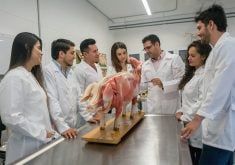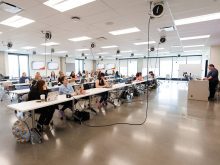Q: I was involved in a claim for crop loss due to chemicals. I lost the case and the judge seemed to believe everything the chemical company’s expert said.
How is it that these experts can state their opinion as to what
happened, when I couldn’t?
A: Modern civil and criminal trials are frequently aided by the use of experts. People watch shows like CSI and assume that the scientific experts always have the answer. Sometimes they do, but sometimes things just boil down to common sense.
Read Also

Fuel rebate rule change will affect taxes and AgriStability
The federal government recently announced updates to the fuel rebates that farmers have been receiving since 2019-20.
There is a lot of law in this area that decides when and to what an expert can testify. The Supreme Court of Canada has ruled on this topic.
There are four factors that govern whether an expert will be allowed to testify and give his or her opinion on a particular subject.
- Their testimony must be relevant to the matter before the court.
- Their testimony must be necessary to assist the judge.
- There must be no rule excluding their testimony.
- The expert must be properly qualified to testify.
The first test is relevance. In your case, an expert on farm chemicals and their effects on soil or crops would seem to relate directly to a claim for agricultural losses. Thus the testimony is deemed relevant because it relates to the thing the court has to decide.
An extreme example of non-relevance is an expert on firearms who would not be allowed to testify on anything to do with your case. A closer example is an expert on commodities pricing and marketing, who may or may not be allowed to testify, depending on precisely what the loss issues are before the court in a case like yours.
The second test is necessity. Expert testimony is allowed where the expert has special credentials allowing him to testify to matters “outside of the scope of knowledge of ordinary persons,” which includes the judge. The judge is an expert in the law but likely has no prior knowledge of how a particular chemical system works. The judge might want and need that knowledge to fully understand the background of the case.
If, however, an expert is called to say you sow seed and it germinates and then grows, that’s within the normal working knowledge of a reasonable person.
The same is true of eyewitness testimony. An ordinary person can give his opinion that someone was drunk, based on the way he or she was acting. But the amount of alcohol in the bloodstream likely requires expert evidence. This is why an expert can give an opinion on scientific matters and lay people cannot.
The third test is lack of exclusion. The law of evidence is complex. All evidence that is relevant is admissible, unless some legal rule applies to keep it out of the trial. Hearsay is an example. With experts, exclusionary rules are relatively narrow.
The fourth test is qualification. The expert must be qualified to give an opinion in the precise area of fact that is before the court. So the firearms expert can’t give an opinion on your crop loss claim, even if he also happens to be a farmer with lots of experience. That’s an obvious example, but the distinctions get finer. Someone might be a soil expert but not a crop expert.
Someone might have expertise to speak about the effects of some chemicals but not others.
This is why before an expert starts to give the substance of his opinion, there is a voir dire (hearing within the trial) to determine whether he has any expert credentials and, if so, exactly what they are. This determines not only whether the expert can be qualified to testify at the trial, but also determines the scope and area of his opinion.
The qualification of an expert requires careful preparation by all lawyers involved and can involve consultations with other or competing experts.
In Canada, recent court rulings have maintained the four-pronged test outlined previously but have emphasized overall reliability as a test. Unless the court is satisfied that an expert can be relied upon, he or she will not be allowed to testify.
While I do not know the details of your case, I suggest that if the opposing expert was believed by the judge, then that person proved to be reliable in the court’s mind.
Rick Danyliuk is a practising lawyer in Saskatoon with McDougall Gauley LLP. He also has experience in teaching and writing about legal issues. His columns are intended as general advice only. Individuals are encouraged to seek other opinions and/or personal counsel when dealing with legal matters.














